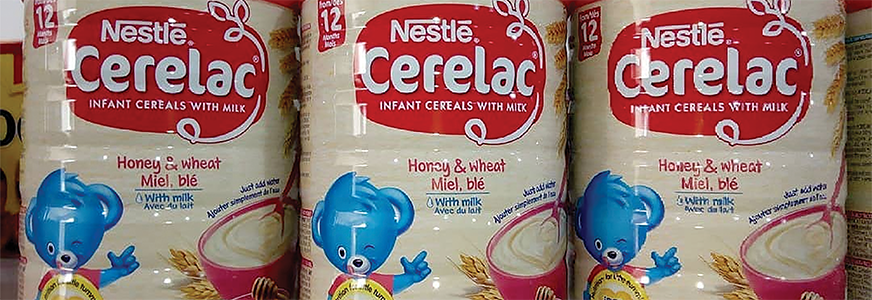DISPARITY: A new probe by Swiss watchdog into Cerelac infant cereals reveals that the multinational’s baby products in Europe come with ‘no-added sugar but those sold in Africa have high quantities of sugar’…
By Monk Nkomo
The Swiss multinational food and drink processing company, Nestle, has been accused of adding sugar to its Cerelac baby food products sold on the African continent amid concerns that this could cause an explosion in diabetes, high blood pressure and cardiovascular diseases in those countries.
The latest investigation by Public Eye, an independent Swiss organisation that exposes human rights violations perpetrated by companies, revealed that despite previous warnings from several civil societies and the World Health Organisation (WHO), Nestle allegedly continued to force-feed sugar to babies on the African continent.
‘’ These findings reflect a continuation of Nestle’s long history of corporate disregard for the health of infants in Africa in the pursuit of profit’’, said Prof. Sara Jewett of the University of the Witwatersrand. Lori Lake from the University of Cape Town, said : ‘’ These practices speak to a long history of colonialism, exploitation and racism.’’
The latest investigation by Public Eye focused on Africa, a key market for the Swiss multinational , where obesity had become a major public health concern. Childhood obesity in Africa was also a rising concern, with the number of overweight children under five nearly doubling since 1990. Most of the African countries were now facing a double burden of malnutrition, where underweight and obesity existed side by side.
‘’ Obesity is already imposing significant costs on Africa’s public healthcare systems. If current trends continue, obesity could increase by more than 250 percent on this continent by 2050, with one in two adults projected to be affected by overweight or obesity’’. Lake added : ‘’ It feels like Nestle is knowingly fuelling the fire of obesity and diet-related diseases in Africa.’’
Public Eye, with the help of various civil society organisations in Africa, said they collected nearly one hundred Cerelac products sold in twenty countries on the continent and had them analysed by Inovalys, a reference laboratory specialising in the agri-food sector. The result was that 90 percent of these products contained high quantities of added sugar.
In contrast, Nestle’s main baby cereal brand in Switzerland, where the company is headquartered, came with zero added sugar. And in key European markets such as Germany and the United Kingdom, where Nestle also sold Cerelac baby cereals, all products targeted at babies from six months onwards, had no added sugar.
Nestle’s alleged decision to add sugar to their cereal products sold in Africa, has been strongly criticised by the WHO which has – for decades – warned that early exposure to sugar could create a lasting preference for sugary products and was a major risk factor of overweight and obesity.
‘’ Obesity is increasing at an alarming rate on the African continent causing an explosion in diabetes, high blood pressure and cardiovascular diseases’’, the WHO said.
The company’s alleged double standard over sugar in baby food – highlighted by Public Eye last year – unleashed a wave of indignation across the world. In India, where the scandal caused a drop in its share price, Nestle announced the introduction of 14 Cerelac variants with no added sugar. In light of this alleged unacceptable double standard, civil society organisations from Africa called on Nestle to comply with WHO’s guidelines and to immediately stop adding sugar to its baby foods, everywhere in the world.
In an open letter , twenty civil society organisations including South Africa, Benin, Burundi, Cameroon, Ivory Coast, Morocco, Mozambique, Nigeria, Namibia, Togo, Tunisia and Zimbabwe, called on the food giant to immediately stop this unlawful practice.
‘’ All babies have an equal right to healthy nutrition regardless of their nationality or skin colour. All babies are equal. So, do the right thing . The world is watching.’’
In 2024, a petition signed by 105 000 people was delivered to the company . ‘’ But as of today, Nestle is turning a deaf ear to this appeal.’’
Public Eye noted that Cerelac infant cereals were the most popular on the African continent. Annual sales exceeded 250 million US dollars and Nestle had a market share of over 50 percent, according to exclusive data obtained from Euromonitor, a company specialising in the food industry.
Petronell Kruger, from the Healthy Living Alliance, a coalition of civil society organisations in South Africa, was outraged by what she termed ‘’ blatant decision-making to feed lower-income countries with poorer quality food. We see incredibly high rates of Nestle marketing and it is often hidden as compassion. ’’
Her message to the Swiss multinational company was forthright : ‘’ Treat African babies like you would treat children in your own family.’’
Public Eye noted that Nestlé was well aware of these risks. “Children can become accustomed to sweet foods,” Nestlé has written on a website aimed at South African parents . “High sugar intake leads to short and long terms risks in children”, the company added. “It is best to limit the consumption of all added sugars to prevent these risks. We do not mislead consumers.”
Jewett said she was not convinced by Nestle’s marketing arguments. ‘’ While fortification should remain part of a public health response to malnutrition we need to look at products as a whole to determine their social value.
‘’ When the fortification is combined with addictive and harmful sugars, the balance does not seem right. The findings highlighted by Public Eye reflect a continuation of Nestle’s long history of corporate disregard for the health of infants in Africa in the pursuit of profit.’’
Contacted by Pubic Eye for comment, Nestlé emphasised its “consistent approach to nutrition for all babies everywhere”. The company explained that it had accelerated the roll-out of Cerelac with no added sugar worldwide, including in Africa. “By the end of 2025, we aim to have introduced variants of no added sugars to all markets where we operate.”
Nestlé stated that it fully complied with national legislations and that its internal guidelines set a threshold for added sugars that was well below that stipulated by the international standard of the UN Codex Alimentarius Commission. Nestlé added that it declared sugar content transparently in accordance with local regulatory requirements.
Public Eye however, said Nestlé’s aggressive promotion of Cerelac was “specially designed” to meet the nutritional needs of babies, offering “an optimal level” of vitamins and minerals for their proper growth and development. And the company targeted parents on social media and other online channels in ways that were often not recognizable as advertising.
Nestlé also targeted health workers, for instance, through the Nestlé Nutrition Institute. It used this platform, whose stated objective was to “share leading science-based information and education with healthcare professionals, scientists and nutrition communities”, to polish its image and extend its influence.
According to Public Eye, Nestlé did not hesitate to assert that its Cerelac products, which were fortified with vitamins and minerals, were key to “help fight malnutrition”, especially across Africa, where “millions of children are impacted by micronutrient deficiencies”.
In Ivory Coast, the consumers association (AIC) condemned what they termed “misleading marketing” by Nestlé, which allegedly endangered the health of the youngest children. It was outraged by the fact that Cerelac products sold in Ivory Coast contained more than six grams of added sugar per serving, while such products had no added sugar in Europe.





























